Okay, so I’ve almost found a way of using Internet Explorer 6 for Windows from my Mac. Almost:
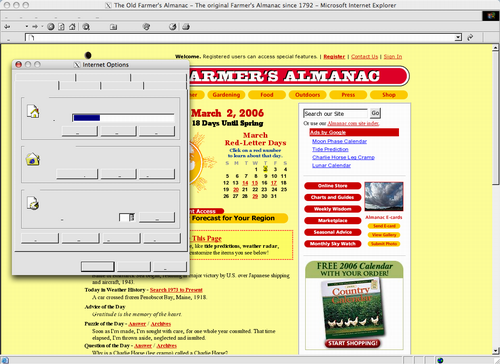
I installed WINE on my RedHat Linux box, then installed IEs 4 Linux (following a pointer from Steven — thanks). Then I simply fired up X11 on my iMac, ssh’ed to the Linux box, and typed ie6. What I ended up with is what you see above.
On the plus side, it’s extremely snappy, seems not to crash, and has loaded and rendered every site I’ve tried so far.
On the perplexing side, as you can see above, the fonts are not appearing properly in the browser’s UI (although they don’t appear to be any font-related problems with sites themselves in the browser window).
This problem doesn’t occur if I run ie6 directly from the X console on the Linux box, so I assume that my problem is related to fonts missing on my Mac, or something to do with the mysteries of XFS.
I’d appreciate any pointers or advice.
Discount airline easyJet announced new service from London Luton to Rijeka, Croatia today (thanks to pointer from Online Travel Review). Service starts June 30 and runs four times a week. Where’s Rijeka? Here’s a map of Croatia:
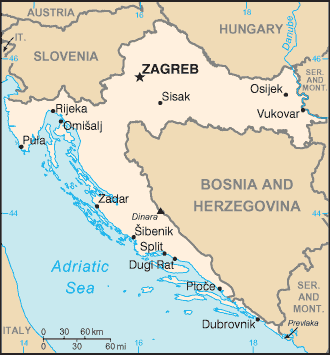
In the Atlantic Canadian tourism television commercial race, 2006 edition, Newfoundland and Labrador has, I think, pulled into an early lead: their Cupids commercial, with its tag line “Where is this place exactly… it’s about as far from Disneyland as you can possibly get.” is brilliant.
A suggestion, though: find a shorter URL than this one.
As Coleman & Lemieux head to Gros Morne this summer, we will likely follow.
Today is the most stressful financial day of the year for me — RRSP day. For those of you in the readership from outside of Canada, RRSPs — Registered Retirement Savings Plans — are tax-sheltered retirement investments that we Canadians can may each year. Basically we can each take a defined chunk of our income, place it in a special type of investment, and thus exempt ourselves from paying tax on the chunk in the current year; when we retire, the money comes out of the investment and we pay tax on it then, but by then we are in a lower tax bracket.
And we have until the last day of February to make the arrangements to do this each year.
And of course, given my laissez faire attitude towards my finances, I always wait until the last day in February to make the required arrangements.
The stress comes because the actual amount that Catherine and I are each permitted to invest is sent to us by Revenue Canada on the previous year’s “Notice of Assessment,” a piece of paper we are mailed once our previous year’s tax return is processed.
So to be effective today required locating those two pieces of paper, sent to us mid-2005. In a sea of other as-yet-unfiled paperwork stretching back quite a while.
Then Oliver and Catherine and I had to drive up to Metro Credit Union where we received characteristically good and stress-free service to complete the deal.
Did I mention that I hate scrounging for paperwork? I was sending out so much negative energy, that Johnny shouted over to make sure I wasn’t having a nervous breakdown.
Anyway, it all worked out in the end. And in the process of sorting through my multi-year pile of un-filed miscellany I found what appears to be an instruction sheet for a rocket-powered motorcycle that I have no recollection of actually having acquired:
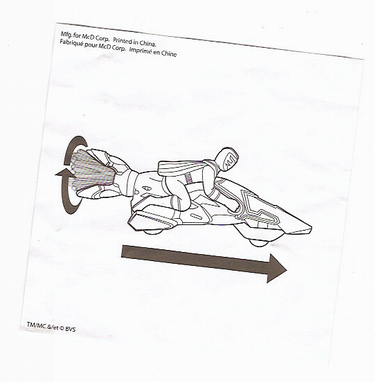
If you were with me when I purchased same, please let me know.
Kudos to the ECMA and the CBC for a good show tonight, but could somebody please fire the sound people: the voices of the performers weren’t synced properly to the video for the first 15 minutes or so of the broadcast, and the quality of the mix, especially starting off, was abysmal (note to Rest of Canada: Chucky Danger Band sounds about 1000% better than you heard them tonight on the CBC). Then there were the drop-outs and the fuzzy bits that appeared at random throughout. Things got better as the broadcast progressed, and by the time Buddy MacMaster came on stage they appeared to be over the worst.
As to the new PEI television commercials, I’m going to reserve judgement until I’ve seen the whole lot.
It seems that my friend David Weale’s reaction to being banished from the kingdom has been to become a nerd. Witness this actual Skype transcript, with an anonymous correspondent, captured this evening:
I am Im-ing with David Weale right now too…he types very slow.
This is the kind of thing that can make my head explode. Cyberspace will never be the same.
In case you hadn’t noticed, in addition to being able to track my whereabouts in a browser, the imaginative folks over at Plazes have enabled the same information to be made available as an RSS feed:
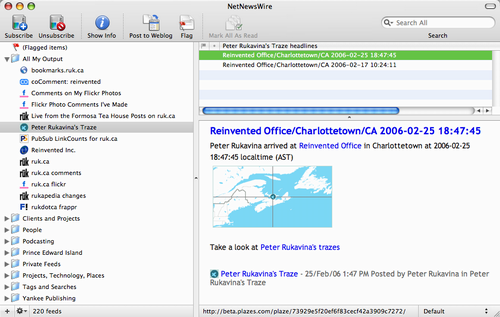
A rather remarkable thing happened yesterday. I decided that it would be a useful and interesting tool for one of my clients to be able to see the location of the customers for their online store on a map. So I took the customer database, the excellent open source MapServer system, and some simple PHP code, and produced this map:
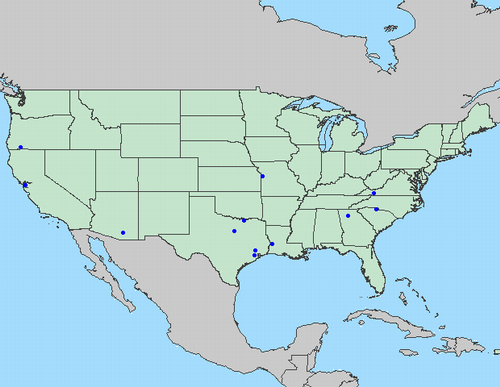
Then, on a lark, I decided to see what the map would look like if I added customer’s first names. And the revised map looked like this (actual customer names changed):
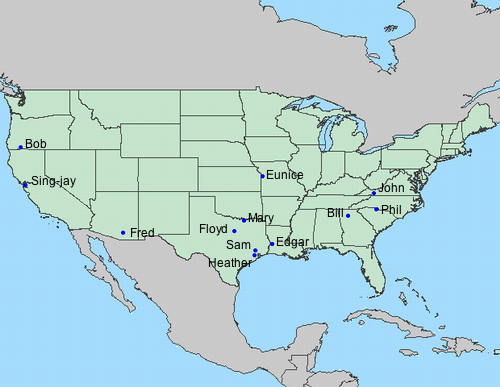
I was caught by surprise: the map suddenly went from being purely statistical to being personal. Bob from Oregon is our customer is a much more powerful piece of information to glean from a map than There is one customer from Oregon.
And I don’t mean to suggest that this is powerful because it allows us to do all sorts of Zellers-like “men between the ages of 24 and 34 who drive Datsuns are more likely to buy power mowers after 7:00 p.m.” kinds of divination.
I mean to suggest that this is powerful because it forces us to see our customers as real people.
Which might sound absurd.
But so much of the web is becoming all about volume. And clickthrus. And CPM. The funds from the people who click right thru this weblog and on to Google-provided ads more than pays for the cost of maintaining the webserver; but to maximize the revenue from those clickers requires treating them as nameless, faceless dupes (“you thought you were coming here for cowboy sex advice — ha! — click on, man!”)
When customers have real names, they suddenly pop into view. And become people. And we’re far more likely to create websites that are, well, people-friendly.
I think that’s a good business model.

 I am
I am